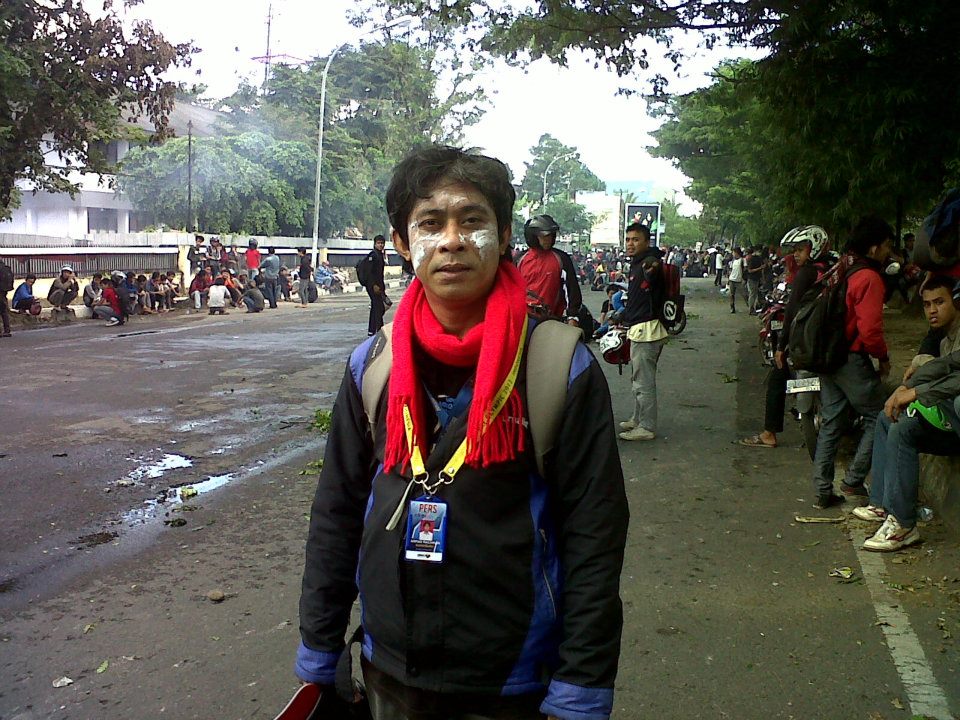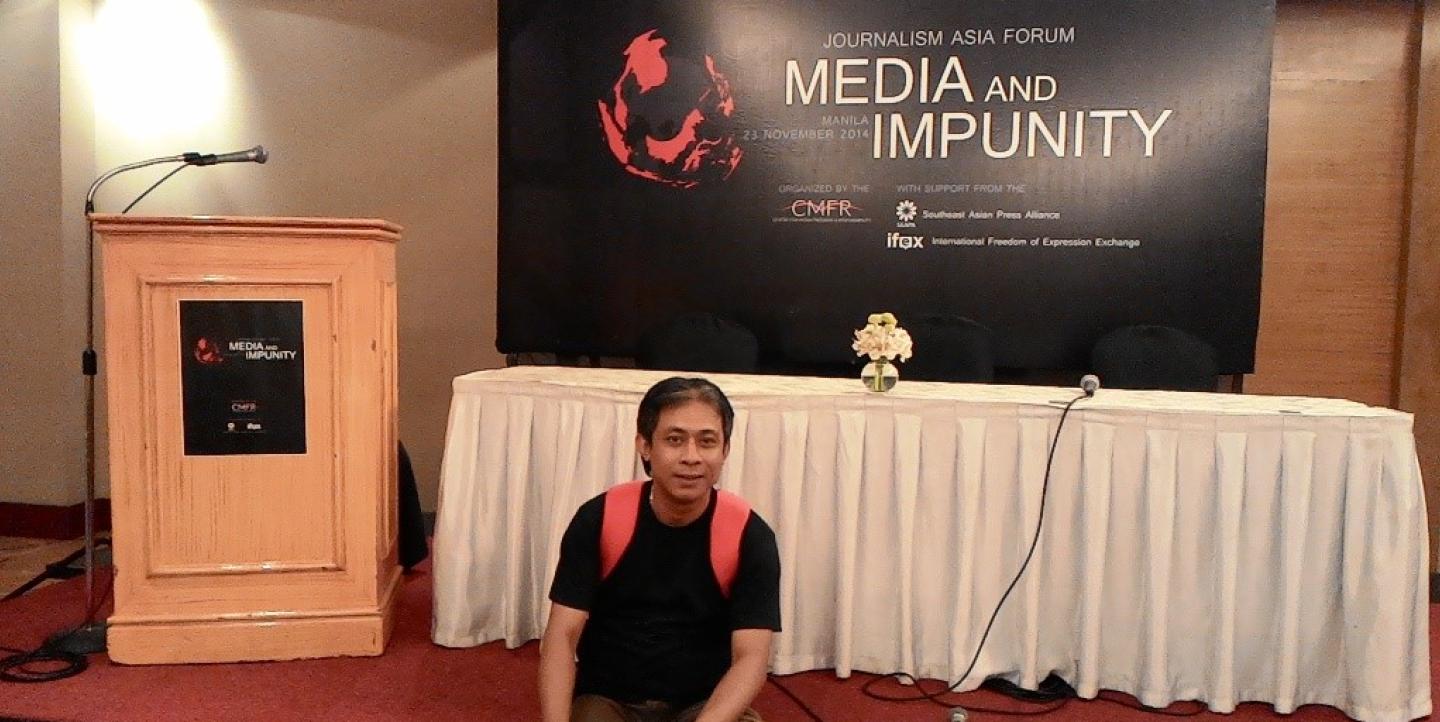Indonesian journalist Arpan Rachman always dreamed of becoming a short story writer. For years, he wrote under a pen name for Sriwijaya Post, a local newspaper in his hometown of Palembang.
Recognizing his writing prowess, in 2007 a friend of Rachman’s helped him get a job at Okezone.com as an economics reporter covering banks and stock markets in Palembang. Over the next few years, he expanded the scope of his reporting to cover all kinds of beats, from sports and entertainment, to politics and daily news.
Throughout his career, Rachman has witnessed press freedom limitations in Indonesia, especially when conducting his investigative work. Today, the country ranks 108 out of 180 countries on Reporters without Borders’ Press Freedom Index. Since 2006, more than 1,000 cases of violence against journalists in Indonesia have been recorded, including 76 this year alone.
In 2011, Rachman married and, with intentions to transition away from journalism, enrolled in a stock trading school. Yet, he never stopped writing. In 2013, he placed third in a writing competition for journalists held by the Indonesian Stock Exchange and a year later participated in a fellowship with the Southeast Asian Press Alliance (SEAPA).
I spoke to Rachman about his journey as a reporter in Indonesia, the difficulties journalists face in the country, and more.
What drew you to journalism?
I was born as a journalist. When I was six years old, I had a rooster. One day it disappeared and I couldn't find it. I knew my rooster was stolen, but no one would tell me where it was. I went to the market and found a chicken seller there. After investigating I found that my neighbors had my rooster. That was my first investigative story at six.
In my early days as a reporter in 2007, I covered a robbery at a money changer [where a police officer was shot dead]. At that time, I covered the news alone. I was expelled by the police when I was about to go in and look at the morgue, and when I wanted to ask questions at the police station. I find it very challenging to do investigative journalism.

Could you tell us about the work you have done over the last few years?
I eventually forgot about my original intention to start trading stocks after the SEAPA program. I began focusing on writing for international media. My first piece, which discussed the possibility of eviction from a residential neighborhood in downtown Makassar for the development of a hotel, was published in TORTURE Magazine in 2015 by the Asian Human Rights Commission in Hong Kong. I also began writing for the non-profit Amsterdam media organization, Global Voices, in the middle of 2015.
I was accepted to work as a journalist at the international desk of Medcom.id in 2016. I was fortunate enough to be approached by multiple contacts in international media during the global COVID-19 outbreak. I wrote for publications including The EarthandI, published in Washington, Global Ground Media in Tallinn, China Dialogue in London, and Kulturaustausch magazine in Berlin. I compose stories on cultural and environmental challenges and contribute news stories to Jakarta's online media Alinea.ID daily. But I haven't written a short story in five years.
Have you reported a story that was particularly hard to cover?
I covered the aftermath of the mass murder of 32 journalists [the Maguindanao massacre] in the southern Philippines as a participant in SEAPA’s 2014 Annual Fellowship. It was emotional for us to meet the journalists’ families; we met the widows and the sons who had lost their husbands and fathers.
It was the one single deadly incident on journalists in the world, 32 journalists killed at one time. The culture of impunity, especially for a private armed group, is very prevalent, in terms of rule of law.
Could you tell me about press freedom and other challenges in Indonesia today?
We have only had some press freedom after the end of the authoritarian era of 1998. But some influence of the time is still left behind, like localized issues and corruption. Indonesia is still a middle-income country, not a wealthy country, and that influences press freedom. Many journalists continue to live in poor conditions, fear and corruption. These are all factors for the lack of investigative work in Indonesia.
Journalists continue to convey the truth even when their profession does not always provide a solution to political issues, which deepened my awareness. Many Southeast Asian journalists, [...] such as Maria Ressa, who received a Nobel Prize for her unwavering opposition to the Philippine President's power, [...] would undoubtedly be motivated to oppose other terrible authorities.
The traits of a closed administration allow for impunity for some offenses against the practice of independent journalism.
In the age of digital disruption, journalists need to engage directly with their audiences. Hoaxes and rumors through social media are more likely to be believed than mainstream media. People tend to be sure of the news from some friends and relatives even though they may not always be accurate. Because of social media's influence, there is a decline in public trust in mass media.
How has IJNet helped you as a journalist?
IJNet has facilitated my enrollment in multiple international journalism courses, the most recent of which is the Thomson Reuters Foundation's Reporting on Locally-Led Adaptation to Climate Change Workshop, which took place in August and September of last year. After completing the course, I got a story grant for a project exploring the profit and loss of biodiversity destruction. I was able to publish an article about saving Sumatran elephants.
I am currently preparing to publish some environmental news stories. I intend to write a book about my journalism journey.
Main image courtesy of Arpan Rachman.
This interview has been edited for clarity and length.


